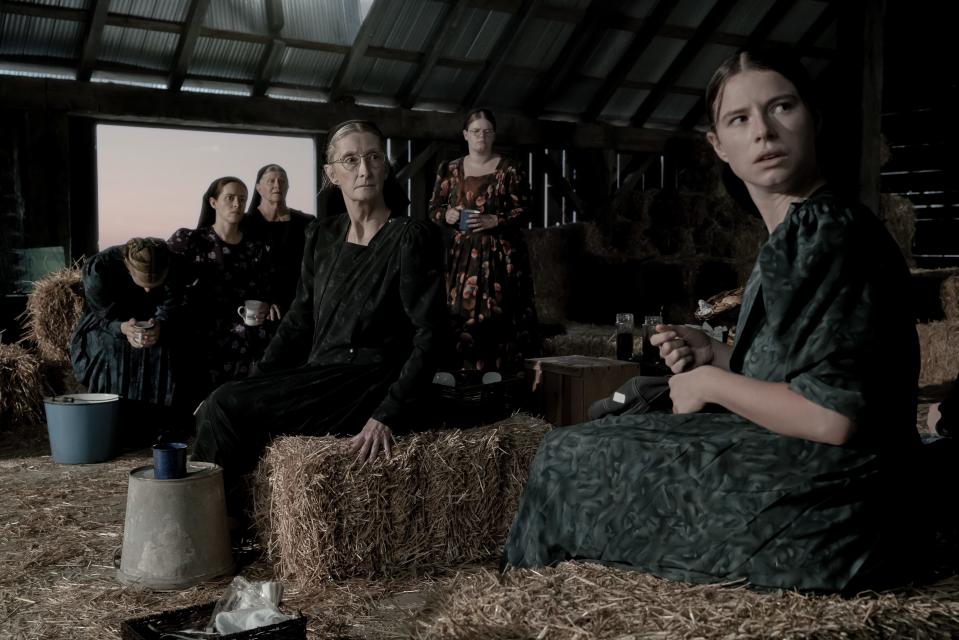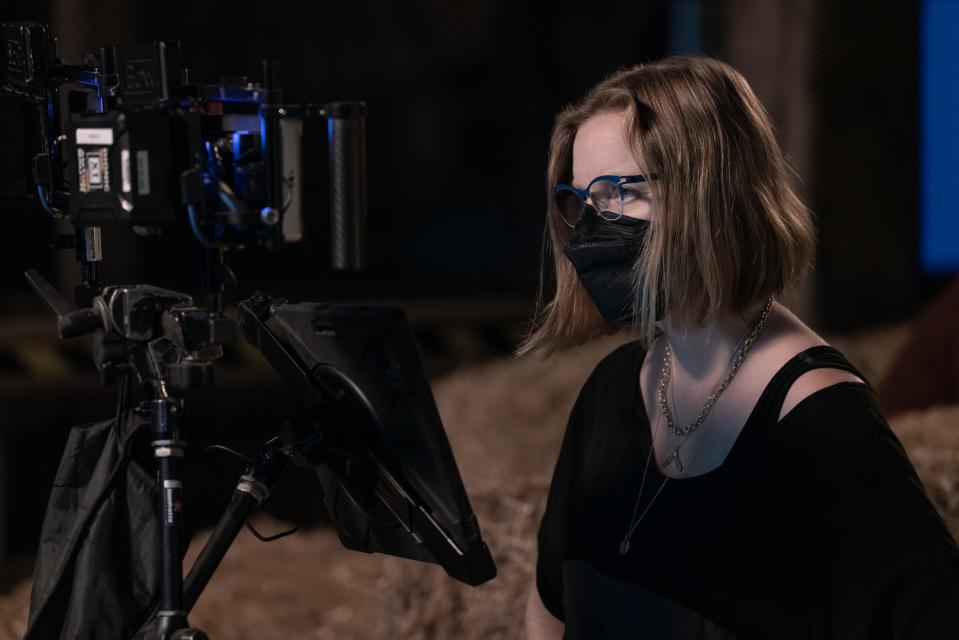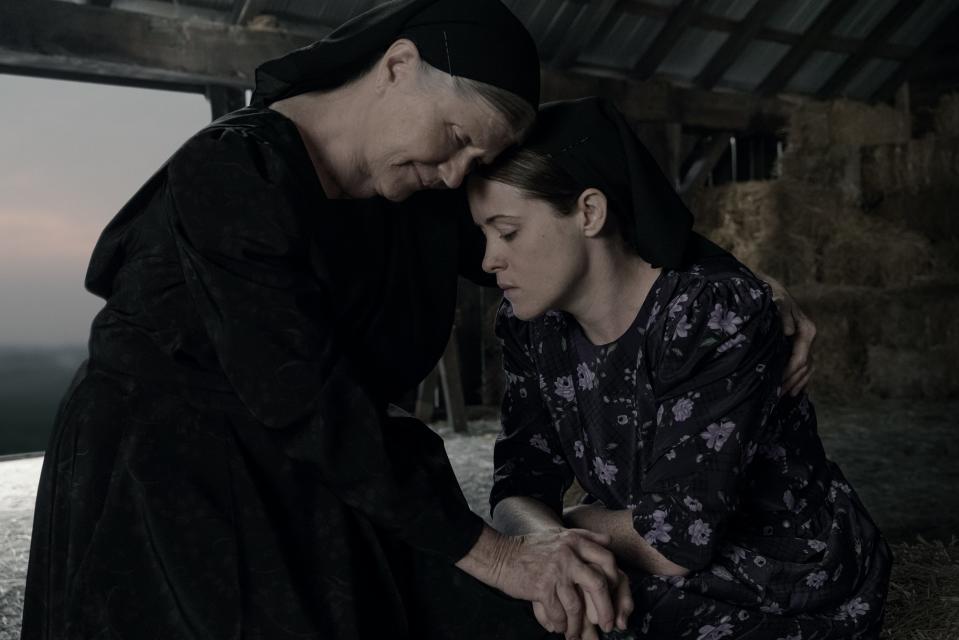'Women Talking' is more than a #MeToo movie: 'This is a timeless conversation'
NEW YORK – Claire Foy has never been part of a project quite like "Women Talking."
The riveting drama (now in theaters nationwide) follows a group of Mennonite women as they reckon with the trauma of sexual assault and debate whether to stay in their isolated colony.
Doing interviews for the film earlier this fall, journalists "were asking questions like, 'What do you think this says about our society?' " Foy says. "All the conversations were so engaged and interested, and as a female actor, that's very, very rare. Often, it's quite surface-level stuff that you get asked, like, 'So, how were the costumes?' "

'Women Talking' has been compared to '12 Angry Men'
Set in 2010 and inspired by real events, "Women Talking" is adapted from Miriam Toews' 2018 novel. Like the book, the movie takes place almost entirely in a hayloft over 48 hours, as women of different generations try to decide whether to stay and fight or leave the men in their community who have drugged and raped them. The film features an A-list ensemble including Foy, Rooney Mara, Frances McDormand and Jessie Buckley, and grapples with complex themes of faith, justice and forgiveness.
"I was captivated by the challenge of it," says director Sarah Polley ("Stories We Tell"). "I know you're supposed to say, 'I immediately saw the film in my head.' I didn't. I thought it would be an amazing experiment. But the more I worked on the adaptation, the more I became convinced this is cinematic."
Given its almost exclusively one-room setting, the movie has frequently drawn comparisons to Sidney Lumet's 1957 courtroom drama "12 Angry Men." Polley thought it would be more of a reference than it wound up being.
"I was really struck by how dissimilar they had to be," Polley says. "I feel like '12 Angry Men,' which I love, is about one discrete problem that doesn't impact any of these people directly, so it doesn't have to feel seismic or be expansive in the same way (as this movie)."

Instead, she looked to other Lumet films including 1975's "Dog Day Afternoon" and 1988's "Running on Empty," for the way that he "loves each of his characters equally and would seek to understand them. I took that with me as a sort of ethos: that I'm not going to judge any of these characters."
Ever since its premiere at Telluride Film Festival in September, the movie has been widely predicted to earn multiple Oscar nominations, including best picture and best adapted screenplay. Some critics have taken issue with the drama's washed-out color palette, but Polley says there is intention behind it.
"I want it to feel like a fable, so I don't think anything in the film is meant to ever feel hyper-realistic," Polley says. But as the women converse in the barn late into the night, the hues of their dresses and faces slowly become more vibrant: "By the end, there's a subtle sense of color creeping in."

Claire Foy plays a mom dealing with 'the most painful thing' imaginable
In the film, Foy portrays the indignant and fiercely protective Salome, who wishes for revenge on the men who attacked her young daughter. Salome delivers some of the movie's most barnstorming yet devastating monologues, as she vents that she would rather burn in hell than let another man touch her child.
Foy, 38, says she was unintimidated by the "pages of dialogue" her character is tasked with and was able to feed off the "adrenaline" of her fellow cast members in her more intense scenes. But for her own mental well-being, she didn't funnel her real-life experiences as a mom into the role.
"Someone you care about being hurt is the most painful thing to ever imagine, and I can't let that in in any significant way," Foy says. "I wouldn't leave the house; I wouldn't let my child leave the house."

Buckley, meanwhile, plays the devoutly religious Mariche, who is reluctant to leave the colony for fear that she and her children will be denied entry into heaven. But in continually forgiving her abusive husband, she realizes that she has unwittingly given him permission to continue assaulting her.
"I felt a lot of love for her immediately, maybe because I didn't understand," Buckley says. "I wanted to understand where the source of pain comes from for a woman who lives by that pain. This is a pain that's been inherited not just from her present circumstance, but from (past generations)."
Sarah Polley, Jessie Buckley say the film's themes are 'timeless'
"Women Talking" arrives in theaters six months after the Supreme Court overturned Roe v. Wade, which guaranteed a constitutional right to abortion, and five years after the Harvey Weinstein scandal brought sexual misconduct to the forefront of the national conversation.
Some journalists have lumped the film in with other so-called "#MeToo movies" this fall, including "She Said" and "Tár." Polley and her actors are reluctant to peg the movie to any one moment or movement, although they hope it will spark a dialogue among moviegoers.
"What is the world we actually want to build? What do we want to see?" Polley says.

There's a poignant line early in the movie about how women in the colony couldn't speak about their bodies and assaults because they didn't have the language for it. Mara's character, the hopeful Ona, imagines a world where young girls are educated and can become leaders in their community.
It's important to give people "the space to talk about (problems) without the fear of repercussions," Mara says. The film "is opening the door to a lot of these conversations in a more nuanced way."
Although the drama takes place in the recent past, Buckley points to how topics of sexual violence and women's bodily autonomy have been relevant for thousands of years.
"This is a timeless conversation," Buckley says. "It doesn't have a stop date or a beginning date – this conversation needs to be forever."
This article originally appeared on USA TODAY: 'Women Talking': Sarah Polley, Claire Foy, Jessie Buckley on new movie
